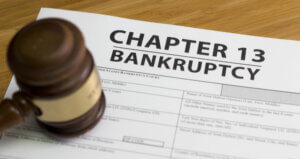Do you know the difference between chapter 7 and chapter 13? Read on to learn about the different types of bankruptcy.

Unfortunately, stresses placed on the economy during the pandemic continue to push individuals and businesses into discharging their debts. As a result, understanding the different types of bankruptcy can be crucial to improving your financial life.
Since Chapter 7 and 13 bankruptcies represent the majority of filings, it makes sense to explore their differences. Depending on your personal debt, one may offer a faster way to get back on your feet than the other.
Don’t procrastinate, read on and discover what both options can offer in the blog below.
What Is Bankruptcy?
Before diving into the differences between these two types of bankruptcy, it’s necessary to discuss the legal process. In addition, you should understand what taking this step means for you both legally and financially.
In short, filing for bankruptcy eliminates your obligation toward your debts. If you or your business reaches the point where a fresh start is necessary, this last resort can give you that opportunity. However, some financial liabilities like child support or student loans may not qualify.
What Is Chapter 7 Bankruptcy?
Chapter 7 is often called a “straight” or “liquidation” bankruptcy.
As the name suggests, the effect of taking this legal action is the discharge of all debts that qualify. However, this process does not include a repayment plan. The judge for your case will appoint a trustee and administrators to manage the selling of your assets to pay for claims from lenders.
Some exemptions for vehicles or personal items apply, but the loss of property is a certainty. If you own your home, a foreclosure or hefty liens can occur as well.
Advantages
While Chapter 7 bankruptcy is generally a “nuclear option” or last resort, it’s not without its advantages. A few examples of how this benefits individuals or businesses include:
- From beginning to end, most of these cases resolve in three to six months
- Debt collectors no longer have the right to contact you
- Exemptions under state law can allow you to keep the property you want or need
- Depending on the type of debt you’ve accumulated, the amount the courts can discharge is potentially limitless
Deciding whether this type of bankruptcy makes sense is a critical advantage of hiring an attorney. If the numbers work out the right way, you can find yourself in a much better financial situation on the other end of the process.
Disadvantages
Considering the consequences and potential losses, filing for Chapter 7 is a decision you shouldn’t take lightly. Here are some disadvantages to consider:
- The trustee will sell non-exempt assets and luxury possessions
- You will no longer have access to your credit cards
- Obtaining a mortgage in the next 6 to 7 years will be next to impossible
- Debtors can only apply for this debt relief once every six years
If a significant portion of what you owe comes from non-exempt liabilities, you may not benefit as much from Chapter 7. Not having enough eligible assets can make this feel like the least attractive option overall.
What Is Chapter 13 Bankruptcy?
You may have heard of Chapter 13 bankruptcy being called a “wage earner’s plan” in the past. This filing allows individuals or businesses to restructure and repay their debts.
As you may expect, approval by a judge for Chapter 13 depends on current income or revenue. If you qualify for bankruptcy, you or your organization will have to make payments for several years.
Advantages
For businesses, filing bankruptcy paperwork under Chapter 13 is an opportunity to rebuild a company that can sustain itself. The same applies to individuals who have enough income potential to repay debts over time. Additional clear advantages include:
- Keeping the home or company you’ve worked so hard to build
- Rebuilding your credit in less time than with Chapter 7
- Stopping aggressive debt collectors from calling you
- Having the option to obtain some lines of credit one to three years later
Some lenders specialize in providing lines of credit to individuals or companies that file for Chapter 13. Having a bankruptcy lawyer who can help determine eligibility for the types of property in your life can go a long way toward getting back to financial normality.
Disadvantages
There are several reasons beyond ineligibility, why Chapter 13 may not work for you. Many businesses or individuals avoid this filing for reasons that include:
- Having to make regular payments for three to five years
- Making it more difficult to file for Chapter 7 later
- Losing your disposable income to repaying your debts
- Limiting the option to pursue Chapter 7 for six years
Unfortunately, a Chapter 13 bankruptcy remains on your record for the next 10 years. As a result of this and other disadvantages listed above, you can even have trouble finding employment with organizations that run credit checks.
Bankruptcy Exemptions in Nebraska Law
Deciding which type of bankruptcy to pursue can often hinge on the exemptions available to you. Everyone has a different situation, so it’s crucial to study current legislation before deciding. As of 2021, Nebraska Revised Statutes have the following options at a maximum of:
- $60,000 in value of your land and home
- $25,000 worth of a health savings account
- $5,000 for tools of your trade
- $3,000 in furnishings and other household items
In some circumstances, you may benefit more from federal exemptions. Additionally, the choices available may change whether you want to file for Chapter 7 or Chapter 13 bankruptcy.
Need More Advice About the Types of Bankruptcy?
Understanding the types of bankruptcy and how they fit your situation can depend on a complex series of facts. While having the opportunity to repay and build credit faster with Chapter 13 sounds like the obvious choice, Chapter 7 can offer a better solution at times.
When it comes to rebuilding your financial future after bankruptcy, having expert advice may save you from years of unnecessary hardship.
Husker Law has the experience Nebraskans need to make these tough decisions. Give us a call at 402-415-2525 today to speak with someone who can help.





